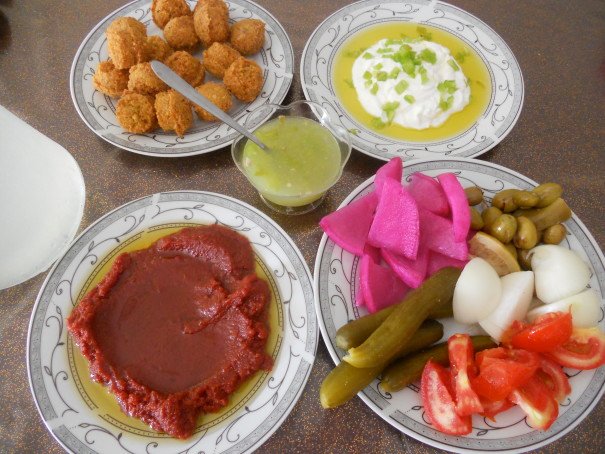
A Palestinian Breakfast in Israel

A Palestinian Breakfast in Israel
Falafel and Labne in Jaljuliya
Food tends to taste better in times of trouble. Maybe you appreciate it more. Perhaps scarcity is a factor, though that certainly was not the case in Israel last summer. As a fan of Mediterranean cuisine, I could not have been in a better place. Despite haphazard rocket attacks, not 60 miles to the south in Gaza it was a whole different story, so I considered myself lucky.
Marrying a Palestinian means acquiring an intricate network of cousins, aunts, uncles, brothers, sisters, nephews, nieces, parents, and close friends, who are also considered family. Since they don’t have a country to call their own, you find members of this extended clan scattered around the globe. Very few of my wife’s father’s family had remained behind in the motherland, but amid the latest melee in the Israeli-Palestinian conflict, we went to see them in the small town of Jaljuliya, just outside Tel Aviv.
We crossed into Israel from Jordan on the first day of a shaky cease-fire. Despite the tense atmosphere, my wife’s oldest cousin, Mustafa, and his wife, who had insisted that we come, greeted us at the border after waiting for hours in the hot sun. Israeli authorities had detained us for no other reason than my wife’s maiden name. Mustafa took us back to their immense home, in which all of their sons, daughters-in-law, and grandchildren lived. While we could have stayed anywhere in that huge building, he insisted that we sleep in his room.
Arab hospitality knows no bounds, and the family went out of their way to make us feel not only comfortable, but also special. We arose the next morning to the smell of fresh pita baking. In fact, every morning, the women in the family would get up early and make falafel and hummus from scratch as well.
They supplemented the meal with other foods a Westerner would not expect to eat first thing in the morning: local olives, pickled vegetables, and a cucumber-tomato salad. I liked the tart taste of the labne, a type of creamy yogurt, though several types of farmer’s cheese proved too salty and pungent for my palate. Everyone dipped their pita in olive oil before covering it in zaatar, a blend of dried thyme, sesame seeds, and sumac, a powdered, tangy berry. The most familiar item on the table was the hard-boiled eggs, sprinkled with a little hot paprika. To wash it down we had tea spiked with fresh mint leaves, though this family also loved their shots of Nespresso. I would never have imagined that such humble food could provide the basis for such a feast.
To enjoy a full spread on the table with the whole family gathered round in the middle of a raging conflict was an obvious blessing. Though displaced from their ancestral lands, and suffering under a lifetime of uncertainty, my wife’s people here had mastered the art of living in the moment and appreciating what they had. They ate as if this was their last meal, elevating a daily ritual into something more like worship.